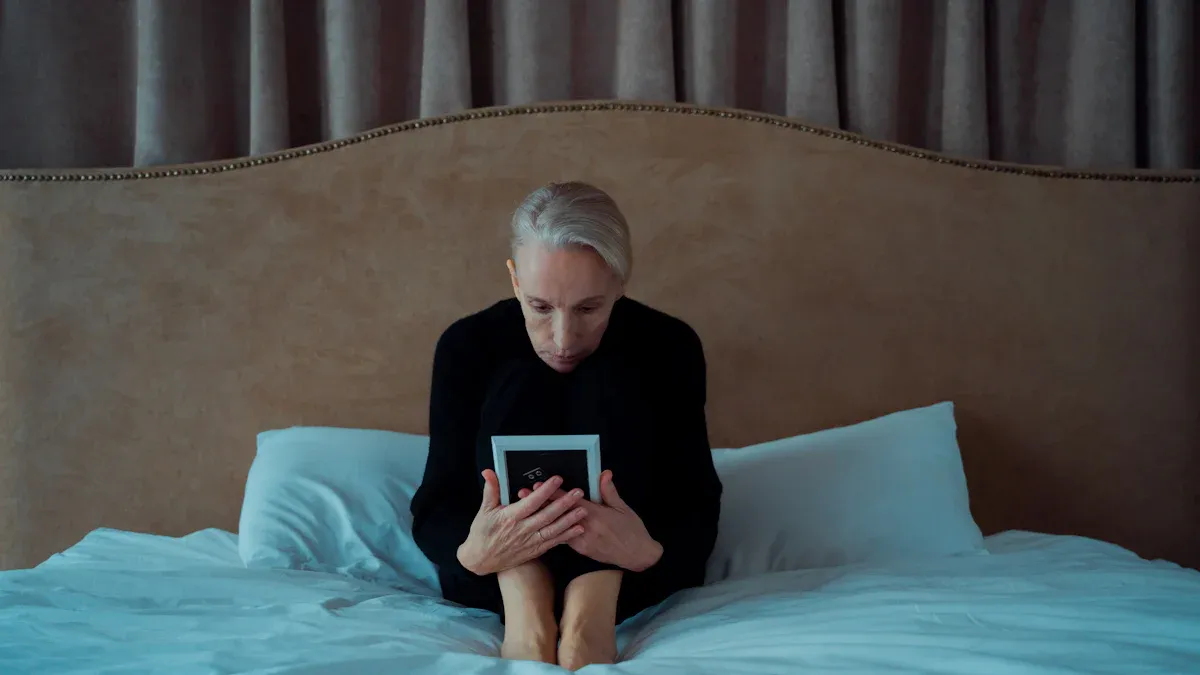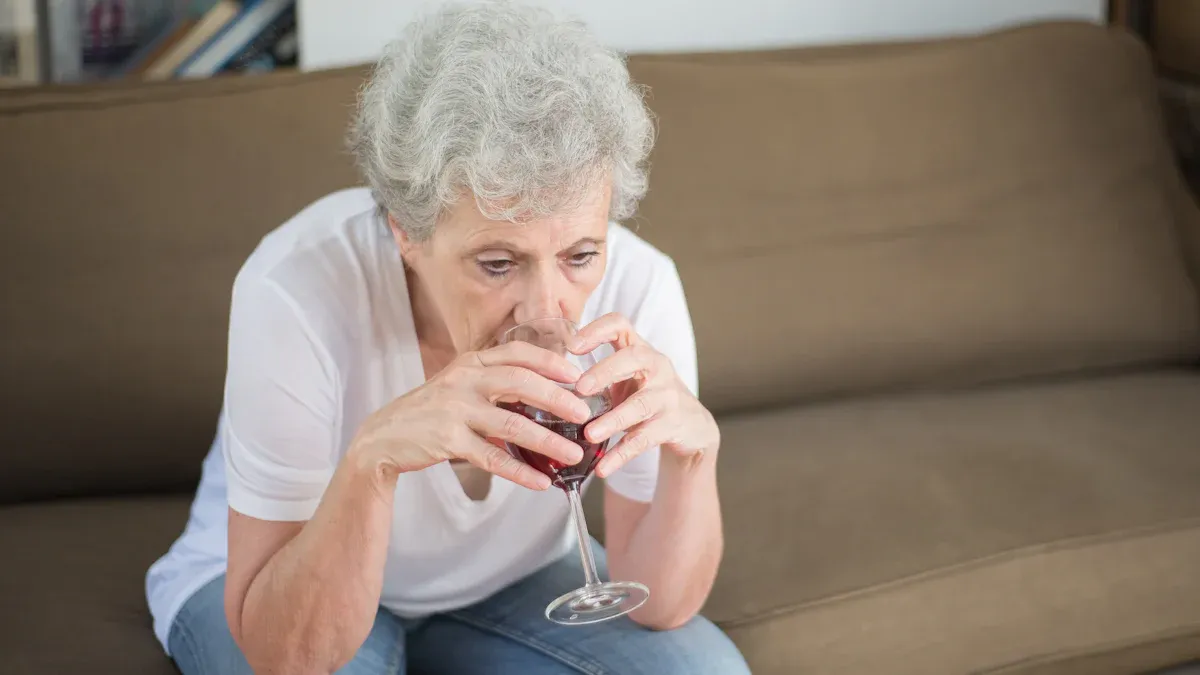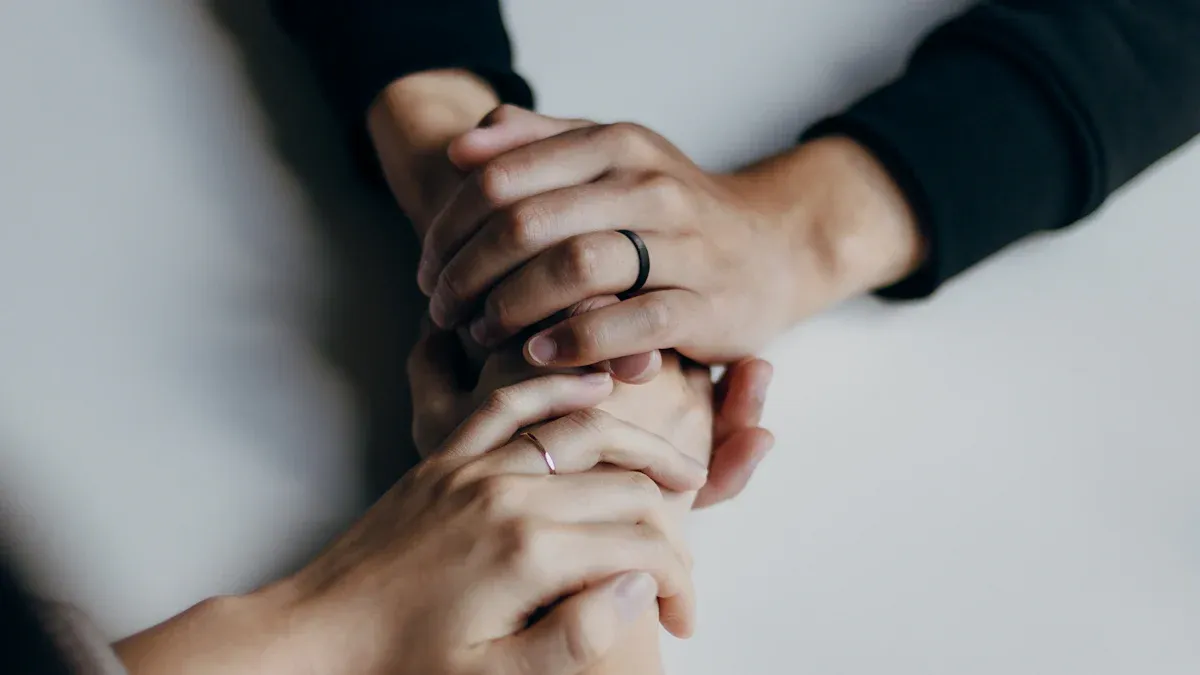Understanding the Stages of Grief After a Cancer Diagnosis

Hearing that you have cancer can feel overwhelming. You might notice a flood of emotions, such as shock, fear, or sadness. This reaction is very common. About 31% of people with cancer report high emotional distress right after diagnosis, while others experience less intense feelings.
Many people go through several stages of grief as they adjust. You may grieve for your health, independence, or changes in your life. Some people also feel a sense of loss about their identity or future. These feelings can come in waves. The Stages of Grief After a Cancer Diagnosis: What to Expect can help you understand that your emotions are valid. Remember, showing yourself kindness and reaching out for support can make a difference.
Key Takeaways
Experiencing a range of emotions after a cancer diagnosis is normal. Feelings like shock, fear, and sadness can come in waves.
Grief does not follow a straight path. You may move back and forth between stages like denial, anger, bargaining, depression, and acceptance.
Seeking support from friends, family, or support groups can help you cope with your emotions. Sharing your feelings can reduce isolation.
Practicing self-care is essential. Focus on healthy eating, rest, and mindfulness to manage stress and improve your emotional well-being.
Recognizing when to seek professional help is crucial. If emotions become overwhelming or disrupt daily life, reach out for support.
Emotional Responses to a Cancer Diagnosis

Initial Shock and Denial
You may feel stunned when you first hear your diagnosis. Shock is often the first reaction. You might feel numb or unable to express your emotions. Some people find it hard to process information and may only take in small details at a time. You could ask for the same information again and again. Sometimes, you might avoid talking about your illness or pretend it is not happening. Family and friends may also show denial by changing the subject or dismissing the diagnosis.
Here is a table that shows common behavioral signs of shock and denial:
Behavioral Signs of Shock and Denial | Description |
|---|---|
Feeling numb | A common initial reaction to a cancer diagnosis. |
Inability to express emotions | You may find it hard to show any feelings. |
Difficulty processing information | You may only be able to take in small amounts of information at a time. |
Repeatedly needing information | You may ask for the same information multiple times. |
Avoidance of discussing illness | You may prefer to talk as little as possible about your diagnosis. |
Pretending illness is not happening | You may unconsciously deny your condition. |
Family and friends in denial | Loved ones may also dismiss the illness or change the subject. |
Common Emotions: Fear, Anger, Guilt, Relief
After the initial shock, you may notice a mix of emotions. Fear is very common. You might worry about your health, treatment, or the future. Anxiety can grow from concerns about medical visits or the possibility of cancer returning. Anger may appear, especially if you feel misunderstood by healthcare providers or frustrated with your situation. Some young people report anger when they feel dismissed.
Guilt can also surface. You may feel guilty for needing help or for not sharing your feelings with friends and family. Relief sometimes comes after diagnosis, but it often mixes with other emotions. Many people experience depression or anxiety. Studies show that about 33% of cancer survivors feel depression, and 30.55% report anxiety. These feelings can change based on your culture, beliefs, and support system.
Tip: Emotional support and talking about your feelings can help you manage anxiety and other emotions. You do not need to go through this alone.
The Stages of Grief After a Cancer Diagnosis: What to Expect can help you understand that these emotions are normal. Your feelings may come and go, and you may experience more than one emotion at a time.
The Stages of Grief After a Cancer Diagnosis: What to Expect
When you face a cancer diagnosis, you may notice your emotions changing from day to day. The Stages of Grief After a Cancer Diagnosis: What to Expect can help you understand these feelings. Many people think grief follows a straight path, but that is a myth. You might move back and forth between stages or feel several emotions at once.
Here is a list of the main stages recognized in psychological literature:
Denial
Anger
Bargaining
Depression
Acceptance
You may not experience every stage, and you might feel them in a different order. Emotions can come in waves, and it is normal to feel sadness, anger, denial, guilt, relief, fear, anxiety, or overwhelm.
Denial
Denial often appears first. You might feel unable to accept your diagnosis. Some people feel numb or overwhelmed. You may avoid talking about cancer or pretend nothing has changed. Denial can help you cope with the shock and give you time to adjust.
Studies show that denial can sometimes help you manage stress. People with moderate or increasing denial often report better physical outcomes. Denial may protect you from depression, especially in the early days. You might notice these behaviors:
Ignoring medical advice or test results
Refusing to discuss your illness
Believing the diagnosis is a mistake
Feeling disconnected from reality
Note: Denial is a natural response. It can help you process difficult news, but if it lasts too long, it may stop you from getting the care you need.
Anger
Anger is a common reaction. You may feel frustrated or ask, "Why me?" The shock of a cancer diagnosis can disrupt your life. You might need to change your daily routine or face new challenges after treatment. Sometimes, anger comes from feeling abandoned or misunderstood.
You may express anger in different ways:
Feeling irritable or impatient
Directing anger at loved ones or healthcare providers
Feeling that life is unfair
Struggling with changes in your identity
Experiencing physical pain or discomfort
Feeling isolated from others
Anger can help you release tension, but it may also strain relationships. Try to talk about your feelings or find healthy ways to cope.
Bargaining
During the bargaining stage, you may try to make deals with yourself or a higher power. You might think, "If I eat better, maybe my cancer will go away." Bargaining often involves guilt. You may wonder if something you did caused your illness.
Common bargaining thoughts and behaviors include:
Wishing for a second chance
Questioning past choices, like diet or exercise
Struggling to accept your diagnosis while searching for ways to cope
Bargaining can help you feel more in control, but it may also bring emotional turmoil.
Depression and Sadness
Sadness and depression are very common. You may feel a deep sense of loss or worry about the future. Depression can affect your mood and daily life. Almost 25% of cancer patients experience severe depressive symptoms. Some cancers, like pancreatic or lung cancer, have higher rates of depression.
Symptoms you might notice:
Persistent sad mood
Loss of interest in activities you once enjoyed
Feelings of guilt or worthlessness
Crying and trouble being comforted
Thoughts about death or suicide
Difficulty concentrating
Changes in appetite
Low energy or fatigue
Trouble sleeping or sleeping too much
Worry and disbelief about what lies ahead
Tip: If you feel overwhelmed by sadness, reach out for help. Support from loved ones or professionals can make a big difference.
Acceptance
Acceptance does not mean you stop feeling sad or worried. It means you begin to come to terms with your diagnosis. You may find a sense of peace or mental calm. Acceptance can help you make decisions about treatment and express your feelings more openly.
Acceptance looks different for everyone. You might:
Feel more at ease with your situation
Approach your emotions with compassion
Take actions that match your values, like joining support groups or talking with family
Experience less struggle with the realities of cancer
Researchers say acceptance is an active process. It can help you cope better and reduce distress.
Here is a table that shows how stages can overlap and change over time:
Stage Model | Description |
|---|---|
Numbness-disbelief | Initial shock and denial of loss |
Separation distress | Yearning, anger, and anxiety |
Depression-mourning | Deep sadness and mourning for the loss |
Recovery | Gradual adjustment and moving forward |
You may notice that The Stages of Grief After a Cancer Diagnosis: What to Expect do not follow a straight line. You can feel several emotions at once, and your journey may look different from someone else's. Remember, your feelings are valid, and support is available.
Coping and Seeking Support

Practical Coping Tips
You can take steps to manage your emotions after a cancer diagnosis. Many people find that talking to someone outside their family helps. Support groups give you a safe space to share feelings and learn from others who understand your experience. You may want to balance in-person and online support, depending on what feels right for you.
Here are some practical tips to help you cope:
Practice self-care by eating well and getting enough rest.
Try mindfulness activities, such as meditation or deep breathing.
Write in a journal to process your thoughts.
Allow yourself moments of joy, even during tough times.
Stay active with gentle exercise.
Plan ahead for appointments and daily tasks.
Connect with your community or support groups.
Respect your own process and remember that everyone grieves differently.
Peer support can help you feel less isolated. You may build emotional resilience and restore confidence by sharing your challenges. Support networks also help children and caregivers adapt and cope better.
Setting realistic goals gives you a sense of control. You may feel more accomplished as you reach each goal. The Stages of Grief After a Cancer Diagnosis: What to Expect can guide you as you move through different emotions.
When to Get Professional Help
Sometimes, emotions become too much to handle alone. You should seek professional help if you notice any of these signs:
Indicator Type | Description |
|---|---|
Persistent anxiety, anger, sadness, or stress that does not resolve over time. | |
Gradual Increase in Emotions | A noticeable increase in emotional responses over time. |
Impact on Daily Life | Emotions that disrupt sleep or prevent you from returning to daily activities. |
Interference with Treatment | Emotions affecting communication and decision-making about your care. |
Unexplained Somatic Symptoms | Physical symptoms without a medical explanation. |
Tip: If you feel overwhelmed, reach out to a mental health professional or counselor. You can also use resources like CancerCare, Cancer Support Community, and GriefShare for extra support.
Here is a table of helpful support resources:
Resource Name | Description | |
|---|---|---|
Mental Health Guide for Cancer Patients and Families | Access to mental health professionals for coping techniques. | |
CancerCare | Free support groups hosted by oncology social workers. | |
Cancer Support Community | Online community for cancer patients to connect and share experiences. | |
Cancer Survivors Network | Safe space for cancer patients and survivors to find peer support. | |
GriefShare | Local support group meetings for working through grief. | |
The Grief Toolbox | Resource hub for various grief tools and support. | |
HealGrief.org | Online social support network for grief. | |
National HopeLine Network | Crisis information and counseling for those in need. |
You do not have to face grief alone. Support is available at every stage.
Every Journey Is Unique
Grief Is Not Linear
You may notice that your feelings change from day to day. Grief after a cancer diagnosis does not follow a straight path. You might feel shock, sadness, anger, or anxiety at different times. Sometimes, these emotions overlap or come in waves. Dr. Lichtenthal describes grief as chaotic and unique for each person. You may experience numbness, worry, guilt, or even existential distress.
Researchers have found that grief does not move through stages in order. Instead, you may cycle through phases like shock and numbness, yearning and searching, disorganization and despair, and reorganization and resolution. Bowlby and Parkes’ model shows that these stages can overlap. You may find that your grief journey looks different from someone else’s.
Your age, beliefs, and relationships also shape your experience. For example:
The absence of religious beliefs may lead to more distress, while having them can help you grow after trauma.
Younger patients in palliative care may cause relatives to struggle more with adjustment.
Your attitude toward illness can affect how your caregivers cope.
Gender, relationship to the patient, and education level can influence symptoms of depression and anxiety.
Self-Compassion and Support from Others
Showing yourself kindness helps you heal. Self-compassion allows you to face fear and anxiety with acceptance instead of self-criticism. You can use this inner resource to regulate your emotions and cope better with stress. People who practice self-compassion often feel less anxious and more balanced during tough times.
Support from others also makes a big difference. Talking with someone about your feelings can help you adapt and process stress. Peer support and social connections improve your mood and help you feel less alone. Here is a table that shows how support can help:
Evidence Description | Findings |
|---|---|
Social support enhances mood and identity | Improves quality of life and coping resources |
Peer support | Supports active coping and reduces anxiety |
Early integration of palliative care | Better symptom management and emotional well-being |
High perceived social support | Reduces feelings of hopelessness and loneliness |
You may need different kinds of support at different times. Healthcare teams often tailor emotional care to your needs, whether you are a patient, child, or spouse. Emotional care works best when it is part of your overall treatment. Remember, reaching out for help is a sign of strength, not weakness.
You may feel many emotions after a cancer diagnosis. Each feeling is part of your healing process. Accepting your emotions helps you cope and move forward. Support from friends, family, and groups can make a big difference.
Accepting your feelings is important for emotional healing.
Recognizing signs of depression helps you seek support.
Social support improves psychological health and coping.
Access to accurate information and resources helps you adjust.
Outcome Type | Description |
|---|---|
Quality of Life | Many people see better quality of life years after diagnosis. |
Emotional Well-being | Emotional health improves with early psychological care. |
Psychological Distress | Support and therapy reduce anxiety and depression. |
You are not alone. With help and hope, you can find strength for the future.
FAQ
What if I do not experience all the stages of grief?
You may not go through every stage. Your feelings can change quickly. Some people skip stages or feel several emotions at once. Your journey is unique.
How long does grief after a cancer diagnosis last?
Grief does not have a set timeline. You might feel strong emotions for weeks or months. Healing takes time. You may notice feelings come and go.
Can children or teens experience grief after a loved one’s cancer diagnosis?
Yes, children and teens can feel grief. They may show sadness, anger, or confusion. Support from family and counselors helps them cope.
Is it normal to feel relief after a cancer diagnosis?
You may feel relief, especially if you waited a long time for answers. Relief is a valid emotion. It can mix with fear or sadness.
What are some signs that I need extra support?
Sign | What You Might Notice |
|---|---|
Trouble sleeping | You cannot fall asleep or stay asleep |
Loss of interest | You stop enjoying favorite activities |
Feeling hopeless | You think things will not get better |
Tip: If you notice these signs, talk to a counselor or support group. Help is available.
See Also
Identifying The Signs Of Male Breast Cancer
Key Symptoms And Triggers Of Gastric Cancer
An In-Depth Overview Of Various Cancer Types
Recognizing The Symptoms Associated With Kidney Cancer
Understanding Embryonal Carcinoma: Essential Information You Should Know

